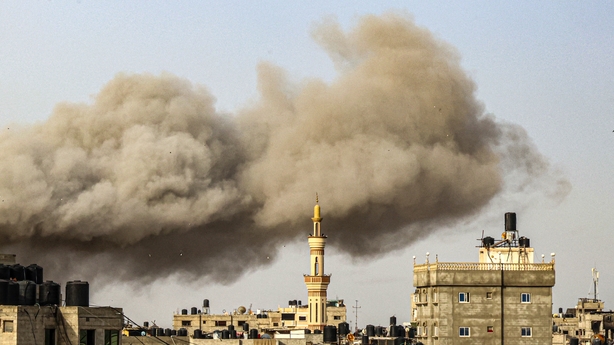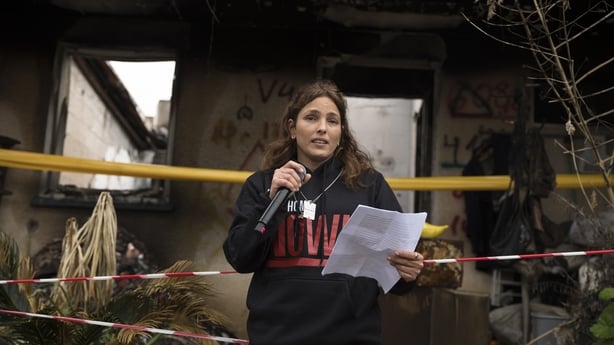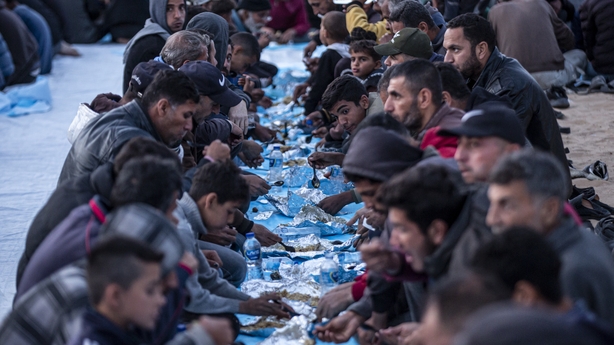Israel has carried out further attacks in Gaza, bombing at least four homes in the far-southern city of Rafah, raising new fears among the more than a million Palestinians sheltering there that a long-threatened ground assault could be coming.
One of the airstrikes killed 11 people from a single family, according to health officials.
Mussa Dhaheer, looking on from below as neighbours helped an emergency worker lower a victim in a body bag from an upper storey, said he had awakened to the blast, kissed his terrified daughter, and rushed outside to find the destruction.
His father 75-year-old and 62-year-old mother were among the dead.
"I don't know what to do. I don't know what to say. I can't make sense of what happened. My parents. My father with his displaced friends who came from Gaza City," he told Reuters.
"They were all together, when suddenly they were all gone like dust."
At another bomb site, Jamil Abu Houri said the intensification of air strikes was Israel's way of showing its disdain for a UN Security Council resolution last week demanding an immediate Israel-Hamas ceasefire.
Next up, he fears a ground assault on Rafah, which Israeli Prime Minister Benjamin Netanyahu has threatened to carry out despite warnings from closest ally Washington that this would wreak a humanitarian disaster.
"The bombing has increased, and they have threatened us with an incursion, and they say that have been given the green light for the Rafah incursion. Where is the Security Council?" Abu Houri said.
A US official has said that Israel had asked to reschedule a meeting in Washington to discuss its plans for Rafah, days after Mr Netanyahu abruptly cancelled the talks over the passage of a Gaza ceasefire resolution by the UN Security Council that the US decided not to veto.
The US abstention from the vote pointed to frustration with Mr Netanyahu, who rebuked Washington over the move.
Further deadly airstrikes
Another Israeli airstrike in Rafah today killed four Palestinians, including a woman and a child and injured other residents, Gaza health authorities said.
Just west of Gaza City in the enclave's north, seven people were killed in an airstrike on a house, health officials said.
The Israeli military says it is targeting armed Hamas militants who use civilian buildings, including apartment blocks and hospitals, for cover. Hamas denies doing so.
Separately, in the Israeli-occupied West Bank, where bloodshed has worsened in parallel with the Gaza war, three Palestinians were killed and four wounded by Israeli fire during a raid in Jenin overnight, the Palestinian health ministry said.

Read more:
One killed by Hezbollah rocket strikes in northern Israel
Government to intervene in South Africa's ICJ case against Israel
UN warns of 'man-made famine'
Gaza has endured almost six months of war and a siege that has cut off most food, water, fuel and other supplies, and the UN has warned that its 2.4 million people are on the brink of a "man-made famine".
The flow of aid trucks from Egypt has slowed amid the war and due to lengthy Israeli cargo inspections.
Donor governments have airdropped food into Gaza where desperate crowds have rushed towards aid packages drifting down on parachutes.
Hamas has urged an end to the airdrops and called for stepped-up road deliveries instead.
United Nations Humanitarian Co-Ordinator for Palestine Jamie McGoldrick said there is very little access to health and aid agencies are unable to deliver as much assistance due to restrictions on deliveries which are "subject to inspections by Israel and just one entry point is open at the moment".
Speaking on RTÉ's Morning Ireland, he said: "The security situation is very difficult because people are desperate because they haven't got enough supplies and every time trucks come out of that gate to deliver assistance.
"The trucks get stopped and get ransacked, so unless we can get more and more food in with more trucks, then we're facing real challenges."
The war broke out when Hamas launched its unprecedented 7 October attack that resulted in about 1,160 deaths in Israel, mostly civilians, according to an AFP tally of Israeli official figures.
The militants also took about 250 hostages. Israel says that, after an earlier truce and hostage deal, about 130 captives remain in Gaza, including 34 who are presumed dead.
Israel's retaliatory campaign has killed at least 32,490 people in Gaza, most of them women and children, according to the Hamas-run health ministry.
Israel also charges that Palestinian militants sexually assaulted 7 October victims and hostages.

The New York Times published the account of the first Israeli woman to speak publicly about having been sexually abused, 40-year-old lawyer Amit Soussana.
Ms Soussana, who was abducted from her home near the Gaza border and released in November, said she was repeatedly beaten and sexually assaulted at gunpoint by her guard inside Gaza.
The non-governmental Association of Rape Crisis Centers in Israel said on social media platform X that Ms Soussana's "heart-wrenching testimony compels the world to act".
"The Israeli government and world governments must do whatever it takes to bring home" the remaining hostages, it said.

Death toll 'far too high'
The UN Security Council on Monday passed its first resolution demanding an "immediate ceasefire" in Gaza and the release of the captives.
The United States, which had blocked previous resolutions, abstained, drawing an angry rebuke from Israel as Defence Minister Yoav Gallant was in Washington.
Pentagon chief Lloyd Austin stressed, before meeting Mr Gallant, that "the number of civilian casualties is far too high, and the amount of humanitarian aid is far too low" in Gaza.
Israeli and Hamas envoys have engaged in weeks of indirect talks aimed at halting the fighting, but both sides said this week the talks were failing.
Qatari foreign ministry spokesman Majed al-Ansari has said that, although the CIA and Mossad chiefs had left Doha, the talks were "ongoing" at a technical level.
Hamas leader Ghazi Hamad charged that Israel "is being intransigent and wants to keep the war going".
"There hasn't been any progress in ceasefire talks or negotiations for prisoners' exchange," he said.

